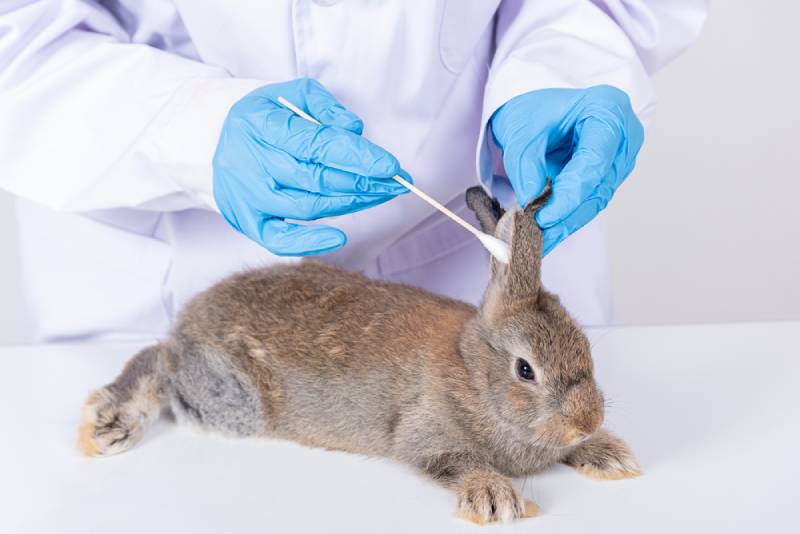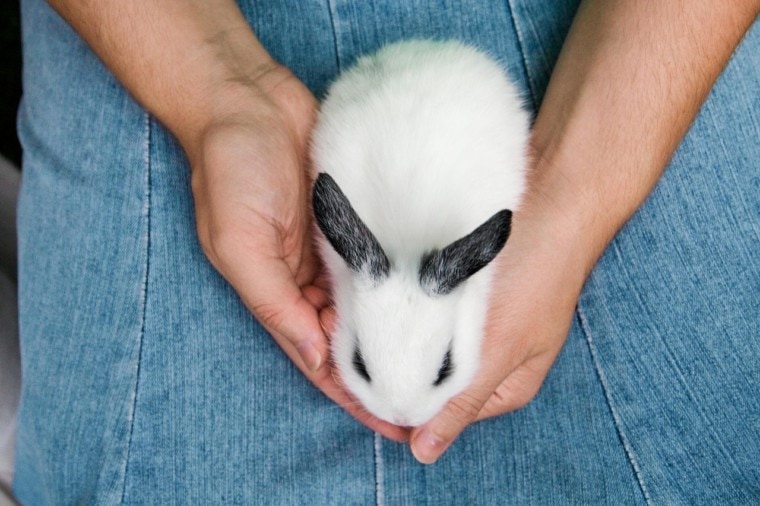
If you were at the bottom of the food chain, you’d probably have even more of a problem with stress and anxiety than you currently have. Most people feel like they’re stressed, and we’re squarely sitting at the very top of the food chain. After all, when was the last time you had to run for your life in order to avoid being eaten? Likely never.
Of course, that could even be the case for your rabbit. It was likely born under human care and has never been chased by a predator. But it’s not far removed from rabbits that were, and the instinct to run at the first sign of danger is embedded deep within the rabbit’s psyche. As such, your rabbit lives in a state of heightened awareness, always ready to take off if a predator shows its head.
Thankfully, there are ways you can help your rabbit calm down. In fact, we’ve found 18 effective methods for calming a rabbit that’s stressed, scared, or anxious. Feel free to try any or all of these the next time your rabbit is displaying the indicators of fear or stress.
Top 18 Ways to Calm a Stressed or Scared Rabbit
It’s not healthy for your rabbit to remain in a highly agitated, stressed, fearful, or anxious state. The longer your rabbit stays in such a state, the worse the effects could be for its health. When you notice that your rabbit seems scared, take action immediately, implementing one or more of these methods to help it return to a calm state.
1. Don’t Make Your Rabbit Stay Outside
In the wild, bunnies live outside. But even though they don’t have comfortable hutches to return to, wild rabbits still prefer to spend much of their time underground in burrows. This allows them to stay protected from predators, so they don’t have to be on high alert at all times.
Even though your rabbit is relatively safe in its hutch, all of the dangers of the outside world are still present and visible to your rabbit when it’s outside. This all adds up to quite a bit of stress for your bunny, stress that can be easily eliminated by simply moving your rabbit inside.
Granted, there are some downsides to bringing your rabbit inside. For instance, the odor of a rabbit’s litter box can be overwhelming. You’ll have to perform cleaning duties more often to combat the odors, but the positive effect that living inside can have on your rabbit is astounding.
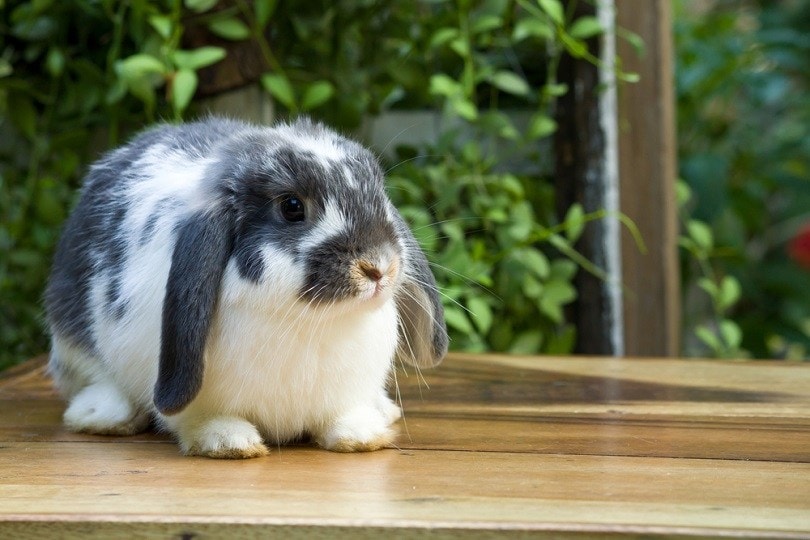
2. Train Your Bunny
When you train a dog, it increases the bond between owner or trainer and canine, but the same effect works with rabbits. By training your rabbit to perform some simple tricks, you can strengthen the bond between you while vastly increasing your rabbit’s confidence. This will help it to feel safer and more secure, which can reduce the amount of anxiety and stress that it’s experiencing.
3. Get Your Rabbit Fixed
You may not realize it, but rabbits can be spayed and neutered just like dogs. And similar to canines, rabbits get calmer and exhibit fewer territorial behaviors when they’re fixed. Additionally, rabbits that have been altered tend to be easier to train for the litter box and don’t spray as much. Altogether, this can lead to a calmer, less stressed rabbit, that’s easier to deal with and creates less of a mess.
4. Make Your Rabbit More Comfortable
If your rabbit’s basic needs aren’t met and its living conditions aren’t adequate, then it’s going to be stressed out and unhappy. You would be as well if your house was a giant mess and you didn’t have the things you needed to feel safe and secure in your home. Here are the things your rabbit needs in order to live happily and healthily:
5. Check for Underlying Illness
If your rabbit is dealing with some sort of illness that you don’t know about, it could be causing discomfort and stress. After learning the signs that identify stress and anxiety in a rabbit, if you notice your rabbit exhibiting those signs and can’t seem to pinpoint a reason, then it might be a good idea to visit the vet. Your vet should be able to diagnose any underlying illnesses that you might not be able to identify.

6. Stick to a Daily Routine
For rabbits that are prone to anxiety, a daily routine can help to keep them calm by repeating everything in a manner that the rabbit can get used to and comfortable with. This includes things like planning daily exercise at the same time every day or eating meals at consistent times. You’ll also want to make sure that your rabbit’s lights are on a schedule so that bedtime is at the same time every night, rather than ever-changing light cycles that can prevent your rabbit from adapting to a specific sleep routine.
7. Give Your Rabbit Some Space
Rabbits are territorial creatures. They want to keep a certain space as theirs and they don’t want that area disturbed. Anytime you’re in your rabbit’s space, it can make them feel uneasy and anxious. To prevent this, make sure your rabbit has its own space and try to stay out of it as much as possible. Also, try to read the signs your rabbit gives you. If it’s turning and running when you approach, then it’s clearly not comfortable with you approaching. Take the hint and come back at another time.
8. Give Your Rabbit Some Time
Sometimes, when your rabbit is stressed or scared, all it needs is a bit of space. In such cases, even attempting to calm your rabbit can make things worse. Instead, you need to just leave it alone so that it can calm down on its own. It could just need some time to adjust to a new visitor, smell, or situation. Each rabbit will calm down in its own time, so don’t rush your rabbit, or you might risk making things worse.
9. Be Calm and Gentle When Handling
Your rabbit can read your emotions, especially when you’re touching it. Whenever you’re handling your rabbit, make sure that you remain completely calm. Handle it gently to avoid scaring or hurting it from the pressure. If you aren’t calm, your rabbit will sense it and will likely begin to squirm and exhibit other behaviors indicative of a stressed bunny. Never handle your rabbit when you’re angry or stressed yourself as you could cause your rabbit to share those emotions.
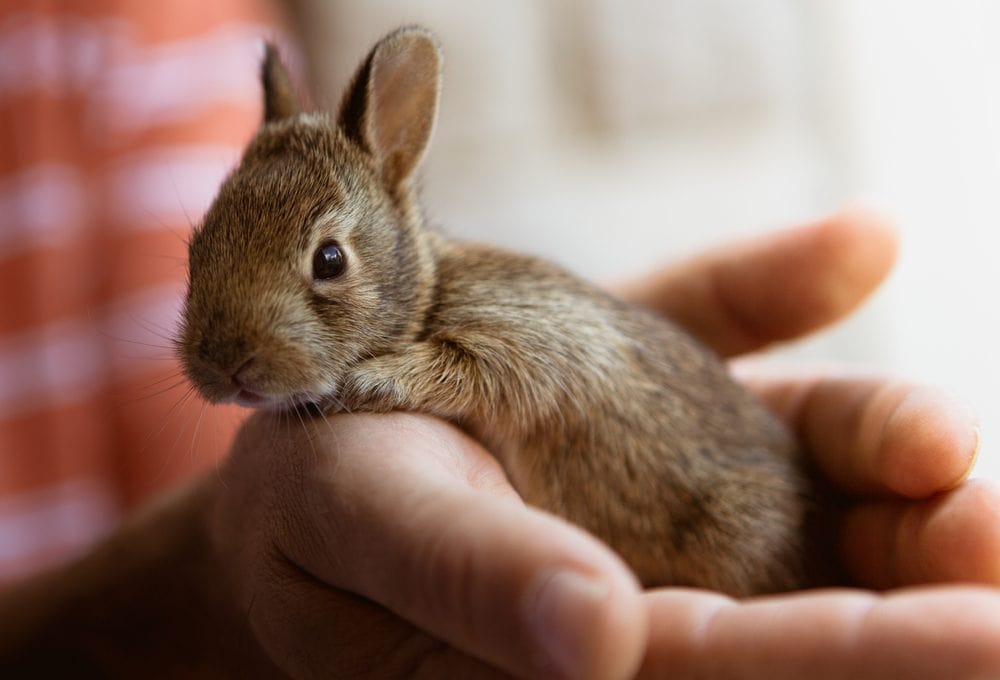
10. Keep Your Rabbit Out of the Cage More
How happy would you be if you were living in a small room and never got to leave it? Probably not very happy. Well, that’s essentially the situation your rabbit is living in. Its entire world is a tiny little enclosure that you’ve given it. If it spends too much time in there, it’s going to get antsy and stressed, as is only sensible.
Luckily, this is rather easy to fix; simply give your rabbit more time outside of its cage. Ensure it’s still safe and well protected from predators and other dangers by keeping it in a run or letting it stay inside, but giving your rabbit time out of its hutch could be exactly what it needs to alleviate stress and anxiety.
11. Let Your Rabbit Make the First Contact
When you’re first getting your rabbit used to being handled, it’s easy to be impatient and try to just pick it up. This is a recipe for disaster though. Your rabbit wants to feel like it’s in control, and picking it up is a surefire way to make it feel like it has no control at all. Rather, you need to let your rabbit decide when it wants to make contact. You’ll have to be patient and let your rabbit come to you. If you do this, you can avoid stressing it out and ensure that future handling goes much smoother.
12. Cover Your Rabbit’s Eyes and Stroke Its Ears
Using one hand, cover your rabbit’s eyes. With your other hand, stroke its ears. This will only work if you already have some trust built up between you and your rabbit. If you do, this should immediately calm your rabbit. Keep its eyes covered and continue petting its ears until the stressor has passed.
13. Keep Your Rabbit Away from Loud Noises
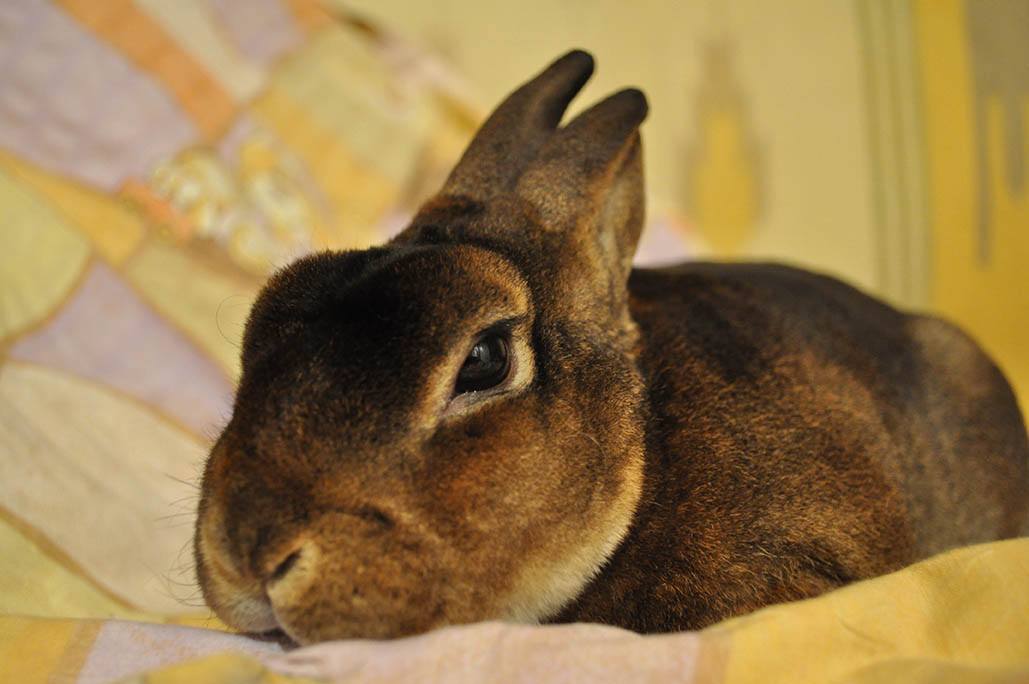
Rabbits are naturally timid and wary. In the wild, they have to be on constant alert in case a predator suddenly appears. As such, they’re constantly looking out for any sign of a threat. Loud noises can represent threats in a rabbit’s mind, increasing their overall stress levels. If your rabbit is living in a noisy area, then the loud noises are very likely to keep it stressed out all the time. Try to move your rabbit to a quieter area of the house that doesn’t see much traffic so it can have a more peaceful existence.
14. Don’t Make Changes that Aren’t Needed
Once a rabbit becomes adjusted to its space, unnecessary changes can cause unneeded stress. Your rabbit will have to become accustomed to the new change, which will take time. During that time, it could be needlessly stressed out and anxious, so only make changes that are necessary to benefit your rabbit in some way.
15. Never Corner Your Rabbit
As prey creatures at the bottom of the food chain, rabbits are rightfully afraid of larger animals cornering them and leaning in. If you do this, you should expect your rabbit’s stress levels to jump through the roof. Even though you’re not attacking your rabbit, when you corner it in an attempt to remove it from its hutch, you’re activating all of those flight responses, making your rabbit feel like it’s about to be attacked, which causes high amounts of stress.
16. Anxiety Attacks Should Be Handled Immediately
Most of the time, it’s in your rabbit’s best interest for you to handle its anxiety attacks right away. The moment you see signs of anxiety in your rabbit, do what you can to help alleviate the issue. If your rabbit is too stressed too often, it could have a severe impact on its health.
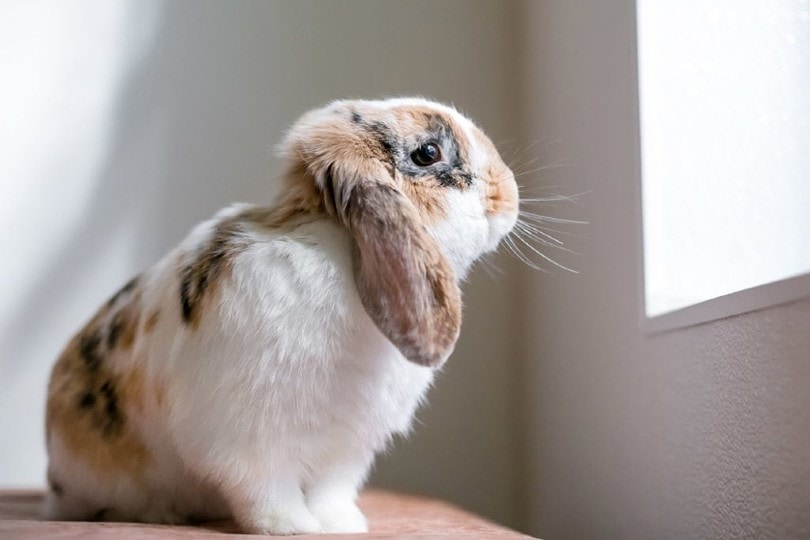
17. Be Careful When Introducing New People
Meeting new people or pets can be an incredibly stressful experience if you’re a little bunny rabbit. Since rabbits are territorial, the effect can be even worse if the new person is in your rabbit’s space. Make sure you’re very careful and methodical when introducing your rabbit to new people and animals, taking your time to prevent any accidents from happening.
18. Learn the Signs of Stress in Rabbits
If you really want to help your rabbit out when it’s stressed, then you’ll need to learn to identify the signs it gives when it’s feeling that way. Rabbits are pretty obvious about their feelings, so it shouldn’t be too hard to figure out when your rabbit is unhappy.
6 Signs of Stress or Anxiety in Rabbits
Since knowing how to identify stress and anxiety in your rabbit is so important, we’re going to briefly go over the six major indicators that you’re likely to notice. These signs aren’t exactly subtle, so if you know what you’re looking for, they’re hard to miss.
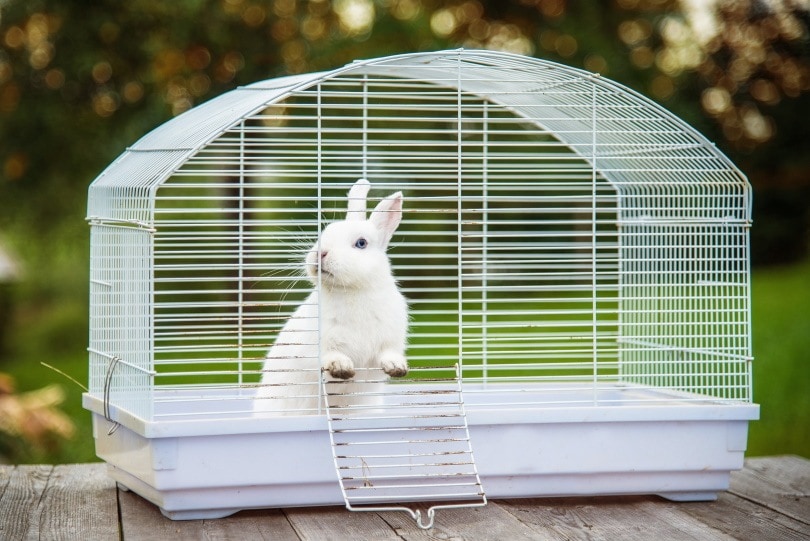
1. Grinding Teeth
When your rabbit starts grinding its teeth, something is majorly wrong. This is a sign of severe stress, fear, or even pain. You might even need to take your rabbit to the vet if it’s grinding its teeth and you can’t identify a specific stressor.
2. Attempting to Hide
In the wild, when a rabbit gets scared, it runs and hides. Your rabbit doesn’t have anywhere to run, but if you notice that it’s attempting to hide, you can be certain that it’s feeling scared and stressed about something.
3. Erect Ears
A rabbit’s ears will lie down on its head relaxed when the bunny isn’t stressed. But once it feels anxious or alert, the ears will perk up and stand tall. If your rabbit’s ears are standing, then it’s probably not comfortable with what’s going on at the moment.
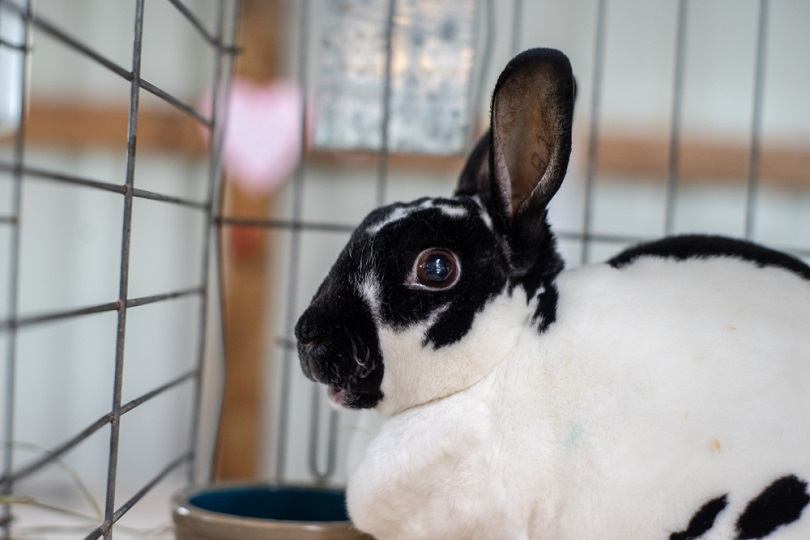
4. Flattening
Flattening is a behavior that indicates a rabbit is about to run. Before running, a rabbit will flatten out its body and tuck its legs beneath so it can take off in a split second.
5. Trembling
When humans are supremely terrified, they often shake and tremble in fear, which is the same thing your rabbit does. This shaking can mean fear, stress, anxiety, or any similar emotion. If you see your rabbit trembling, you need to determine the cause because your rabbit is extremely uncomfortable and unhappy.
6. Thumping
Bunnies thump their feet on the floor loudly when they’re trying to communicate that something is bad, dangerous, or making them unhappy. While thumping, a rabbit might also make distressed grunting noises.
Final Thoughts
If you want to help calm your rabbit down when it’s feeling scared or stressed, then you’ll need to learn to read the signs that your rabbit gives. Once you can read the signs of fear or stress in your rabbit, you can help it to calm down as soon as a problem arises. Luckily, you’ve got multiple methods to utilize, so if one of these doesn’t work with your rabbit, keep trying different methods until you find the ones that work best with your bunny.
See also:
- 13 Calmest Rabbit Breeds (With Pictures & Info)
- How To Calm Your Rabbit During Thunderstorms: 15 Vet Approved Tips
Featured Image Credit: Pixabay





